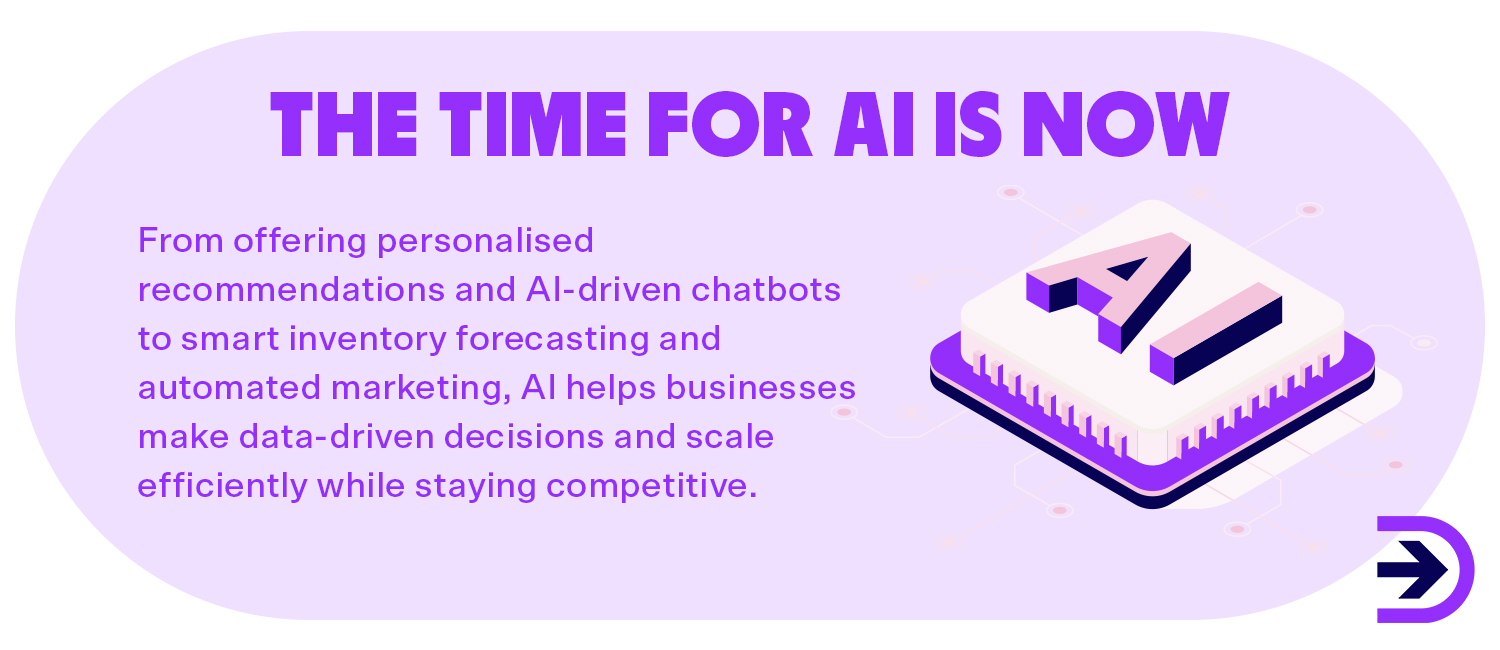
What Is the Role of AI in Dropshipping in 2025
The dropshipping landscape has changed dramatically, and in 2025, AI is at the centre of this transformation. Tasks requiring hours of manual work, such as market research, pricing strategies, customer support, and supply chain management, can now be handled efficiently with AI tools. From predicting trending products before they go viral to automating order fulfilment, AI is making dropshipping smarter, faster, and more profitable.
Retailers no longer have to rely on guesswork. AI-powered tools can identify winning products, dynamic pricing models can adjust in real time, and chatbots provide 24/7 customer support, enhancing the shopping experience. Even fraud detection and supplier vetting have become more precise, reducing risks and improving reliability.
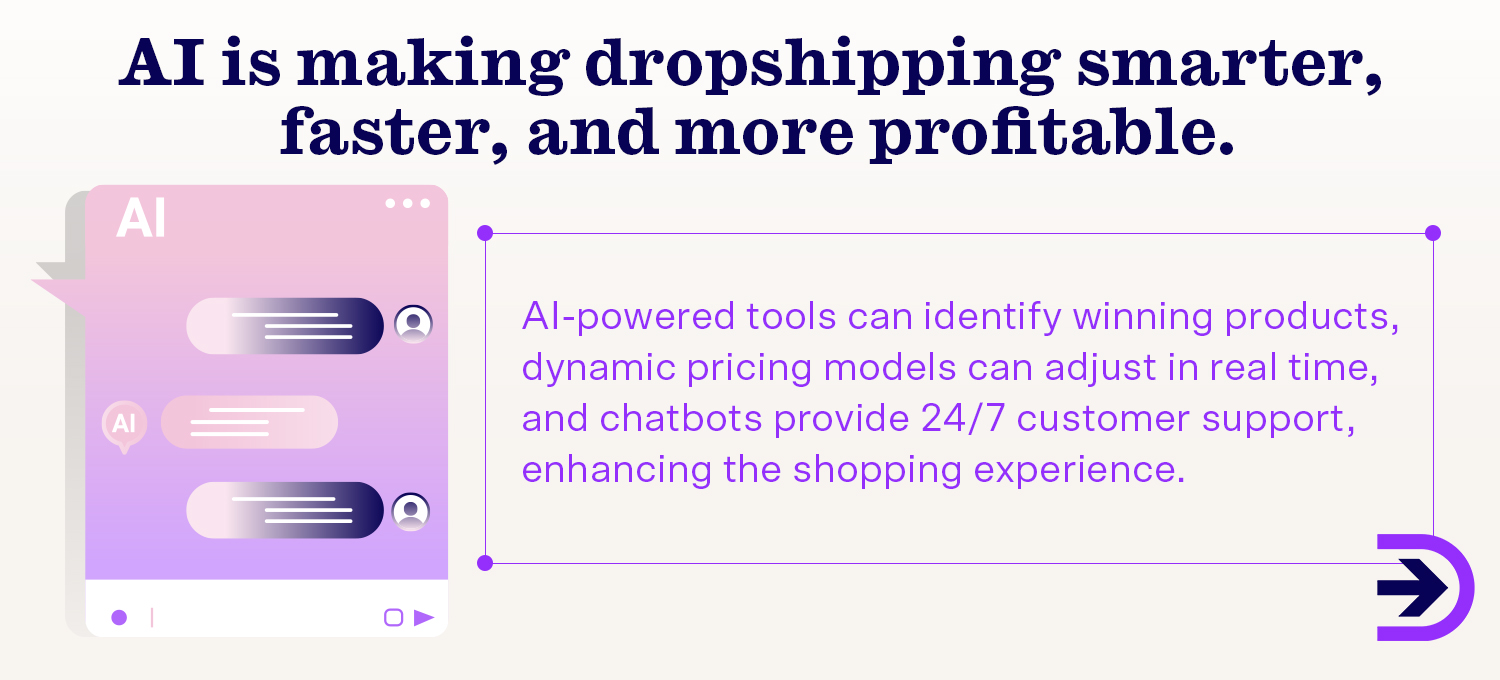
Whether you’re a seasoned dropshipper or just starting a dropshipping business, integrating AI into your business is no longer optional, it’s essential for staying competitive. In this blog, we’ll explore how AI is reshaping the future of dropshipping business and the key innovations driving this change.
What is the role of AI in dropshipping?
Wondering how to use AI for a dropshipping store? AI plays a significant role in dropshipping by optimising various aspects of the business, from product selection to customer service. Here’s how dropshipping AI tools can help enhance your dropshipping business:
Product research and trend analysis
AI tools make product research easier by analysing market trends, search data, and customer preferences. They suggest high-demand, low-competition products, helping retailers stay ahead of trends. AI also predicts seasonal demand, reducing the risk of selling outdated or slow-moving items. Instead of relying on guesswork, retailers can use data-driven insights to choose profitable products faster.
Automated pricing and competitor analysis
AI tools continuously monitor competitor prices and adjust pricing strategies dynamically to stay competitive while maximising profit margins. These tools factor in demand, supplier costs, and market conditions to optimise profit margins while ensuring affordability.
Automated pricing tools help retailers stay ahead in competitive markets without constant manual adjustments. This dynamic pricing strategy maximises revenue while keeping customers engaged with fair pricing.
Smart inventory management
Even though retailers don’t store inventory, AI helps predict demand by analysing past sales, trends, and seasonal shifts. This prevents stockouts and delays from suppliers when demand spikes, ensuring smoother order fulfilment. With better forecasting, dropshippers can avoid fulfilment issues and provide a more reliable shopping experience.
Personalised marketing and customer insights
AI-powered tools help retailers reach the right customers with targeted ads, email campaigns, and personalised product recommendations. It studies customer behaviour, purchase history, and engagement patterns to create tailored marketing strategies. This boosts conversions and encourages repeat purchases. AI also helps optimise ad campaigns, store layouts, product descriptions, and promotions to improve the shopping experience.
AI-powered chatbots and customer support
AI-powered chatbots can handle customer questions anytime, whether they’re about order tracking, product details, or returns. This reduces wait times and improves customer satisfaction. Chatbots can also offer product recommendations and handle FAQs, freeing up human support agents for more complex issues. With multilingual and sentiment analysis features, AI ensures smooth communication across different customer bases.
Fraud detection and risk management
AI helps protect dropshippers from fraud by detecting unusual transaction patterns and flagging high-risk orders. It analyses payment methods, order locations, and buying behaviours to minimise chargebacks and scams. AI tools also verify customer authenticity and monitor supplier reliability, reducing financial risks and helping retailers build a trustworthy business.
Automated order processing
AI takes the hassle out of order fulfilment by automatically placing orders with suppliers, tracking shipments, and updating customers in real time. This reduces errors, speeds up delivery, and ensures a smoother process from purchase to delivery. AI tools can even predict potential delays and suggest alternative suppliers, allowing retailers to keep things running smoothly while focusing on growing their business.
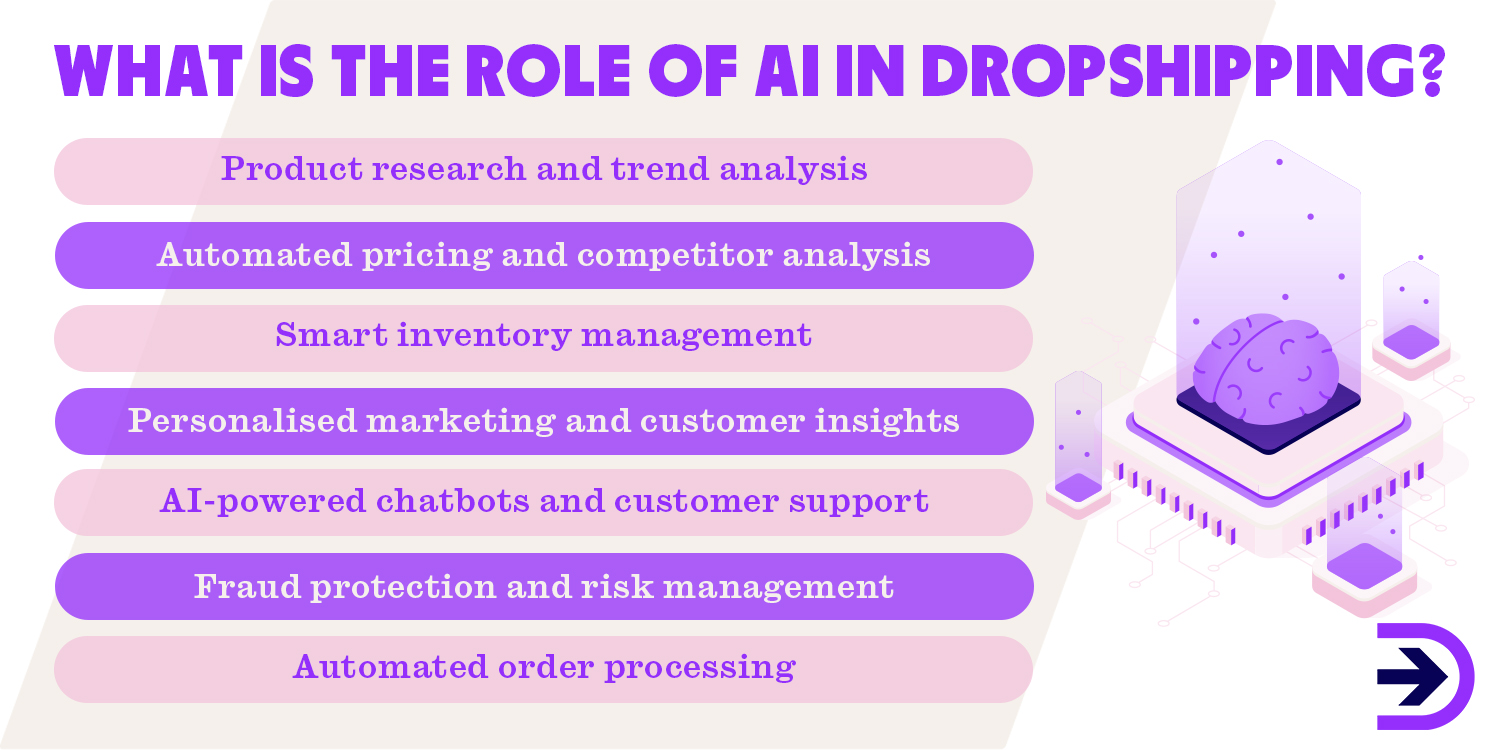
How AI will affect dropshipping in 2025
AI is set to transform dropshipping by making online retail more adaptive, efficient, and competitive. One of the biggest shifts will be AI’s ability to replicate the in-store shopping experience. Online retailers have struggled to match the personalised service of brick-and-mortar stores, but AI is changing that. With personalised recommendations, AI-powered live chat, and even AR/VR shopping experiences, customers will enjoy a more interactive and tailored journey, bringing ecommerce closer to the concierge-like service of physical stores.
The demand for specialised services will also rise, as consumers seek curated shopping experiences over generic product selections. AI will drive market diversification by identifying niche opportunities and tailoring product suggestions to highly specific audiences. This shift could accelerate the decline of general stores, as retailers increasingly focus on micro-niches to stand out. AI-powered marketplaces will also expand, as AI reduces the cost of implementation and makes it easier for businesses of all sizes to launch and manage their own marketplace-style stores.
Another major shift will be AI-driven marketing and business growth. With AI handling routine tasks, businesses will have more time and resources to focus on creative marketing, SEO, and customer engagement. AI will also improve ad targeting, ensuring marketing budgets deliver higher ROI while allowing brands to experiment with more innovative strategies.
Supply chains will become more resilient, as AI enhances logistics automation and predictive inventory management. Consumers are becoming less focused on fast and free shipping and more concerned with reliability. AI will help retailers proactively avoid stock shortages, recommend alternative suppliers in real time, and optimise fulfilment strategies to reduce disruptions.
Lastly, fraud detection and security will become more sophisticated. AI will go beyond identifying fraudulent transactions and protecting customer data. It will predict potential risks before they happen by analysing behavioural patterns, location data, and order history. This will help dropshippers reduce chargebacks and improve business security.
In 2025, AI won’t just enhance dropshipping, it will redefine it. Retailers who embrace AI will gain a competitive edge, offering personalised experiences, smarter marketing, and stronger supply chain management, all while reducing operational costs and increasing profitability.
Common AI technologies used in dropshipping
Let’s explore some common dropshipping AI tools used in ecommerce and dropshipping.
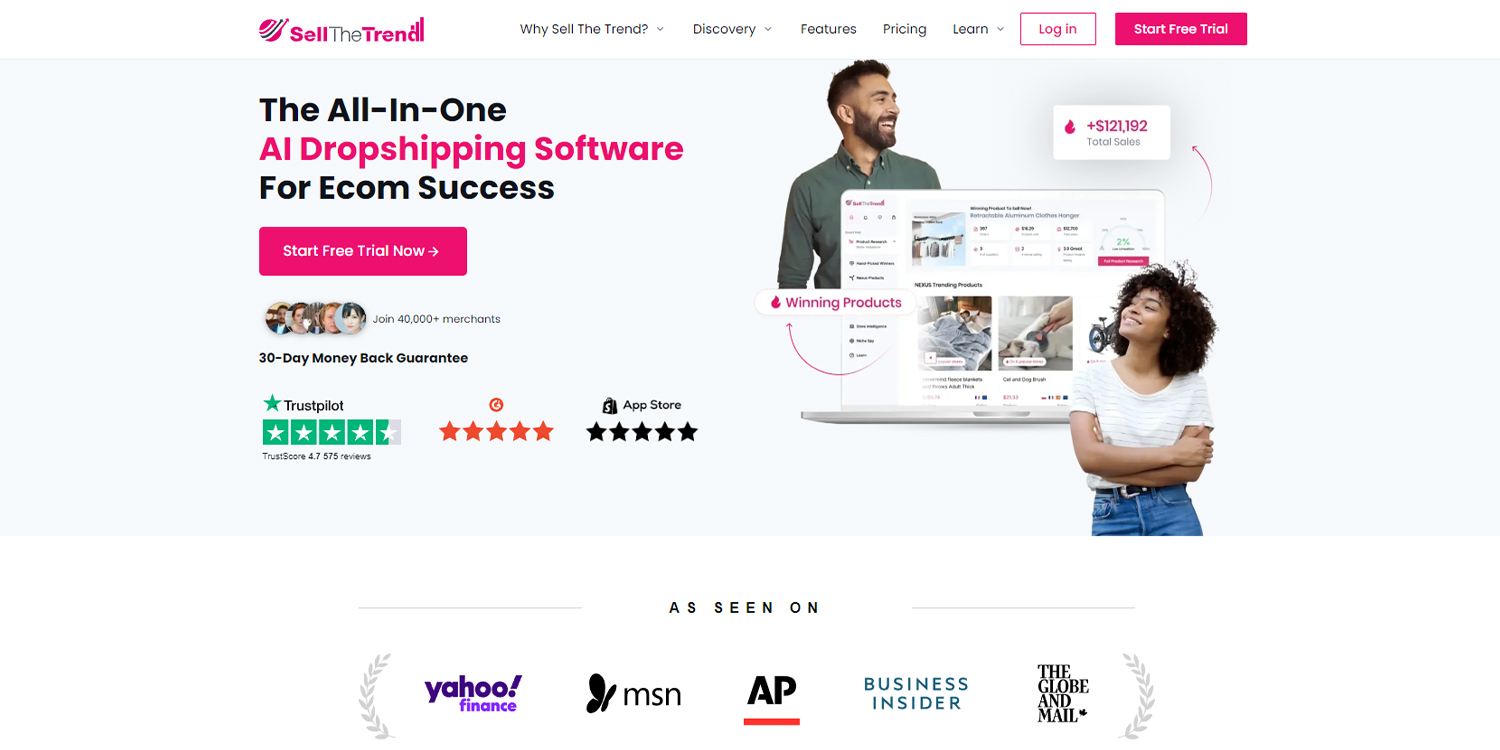
Sell The Trend
An all-in-one AI-powered platform, Sell The Trend is a powerful tool for finding best-selling dropshipping products early. It offers tools for product research, content creation, and instant AI store building. You can effortlessly find, research, and import trending products to your online store. The platform has over 1200+ verified and rated suppliers, each one ranked on shipping speed, product quality, and communication. Additionally, you can automate your entire store from product listing to order fulfilment, allowing you to focus on growing your dropshipping store.
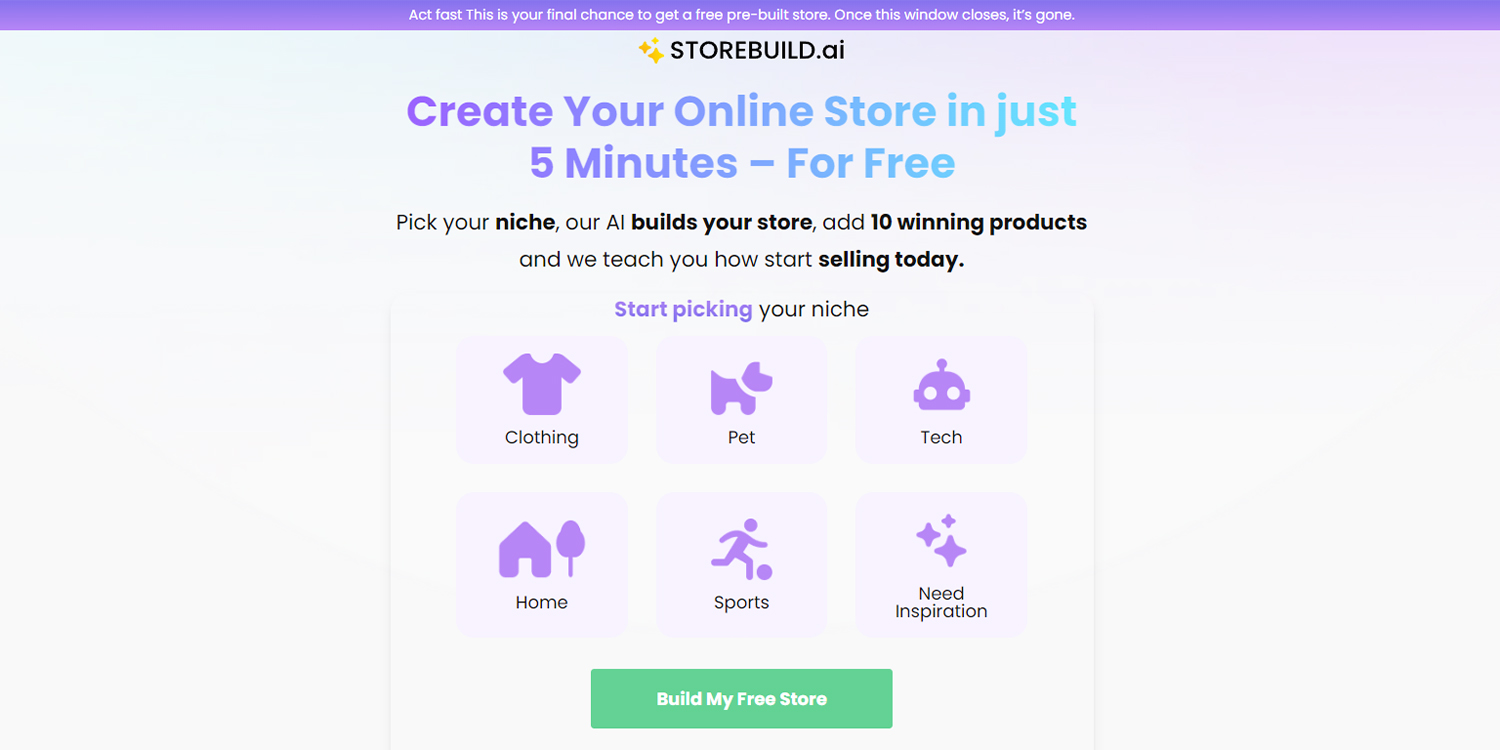
Storebuild.ai
Storebuild.ai helps create your dropshipping store in just 5 minutes - for free. Simply choose a niche for your online store, and the AI tool will do the rest. It builds your store, adds 10 winning products, and walks you through the selling process. The platform has a wide range of winning products and high-converting store designs to make sales faster. You can also get a custom-designed theme to fit your brand and spotlight your products for additional charges. For a better dropshipping experience, you can automate everything from product sourcing to order fulfilment.
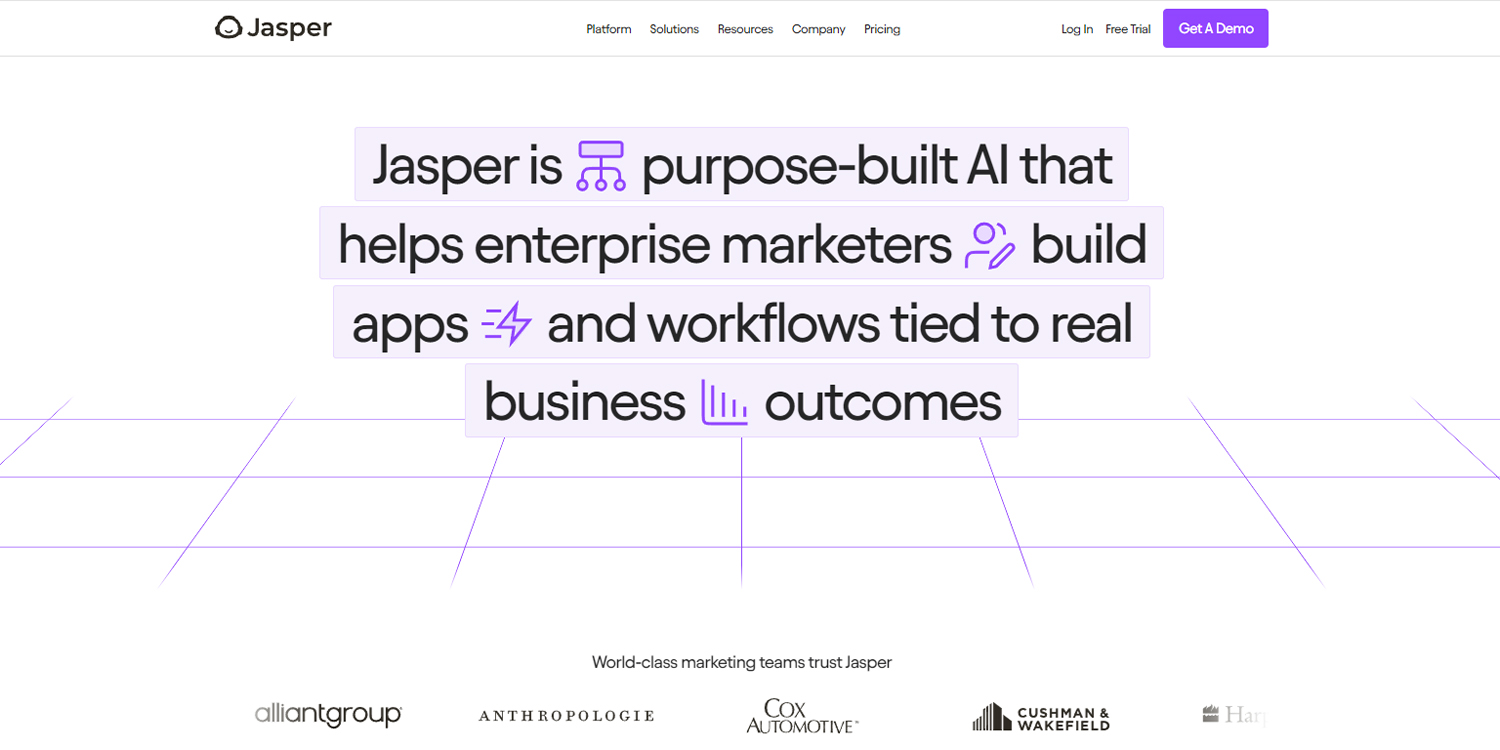
Jasper
Jasper is a purpose-built generative AI platform for marketing success. Built on the foundation of enterprise trust, Jasper deeply understands marketing, delivering advanced brand control and an intuitive AI toolkit that allows marketers to build apps and workflows to accelerate their success. Its advanced AI toolkit includes Jasper Studio, Marketing AI Toolkit, Knowledge & Context, and Trust Foundation.
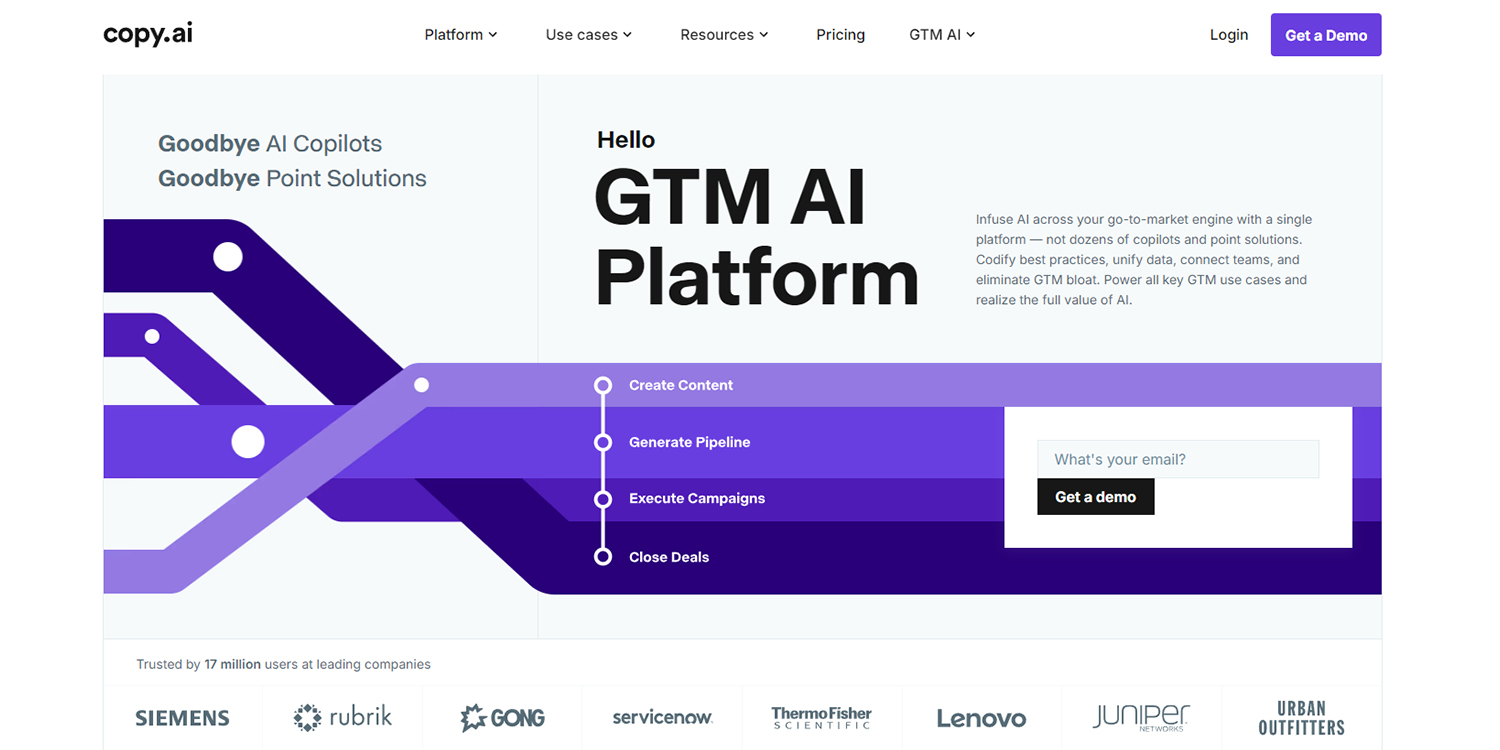
CopyAI
Power your go-to-market strategy with theCopy.ai GTM AI Platform. It's an AI writing tool designed to write product descriptions and marketing content, streamline processes, unify data, and optimise performance across your entire revenue lifecycle. Its solution codifies complex workflows and leverages multiple language models to deliver unparalleled efficiency and insights. With usage-based pricing,Copy.ai helps you maximise value while minimising costs, empowering your teams to work smarter, drive growth, and stay ahead.
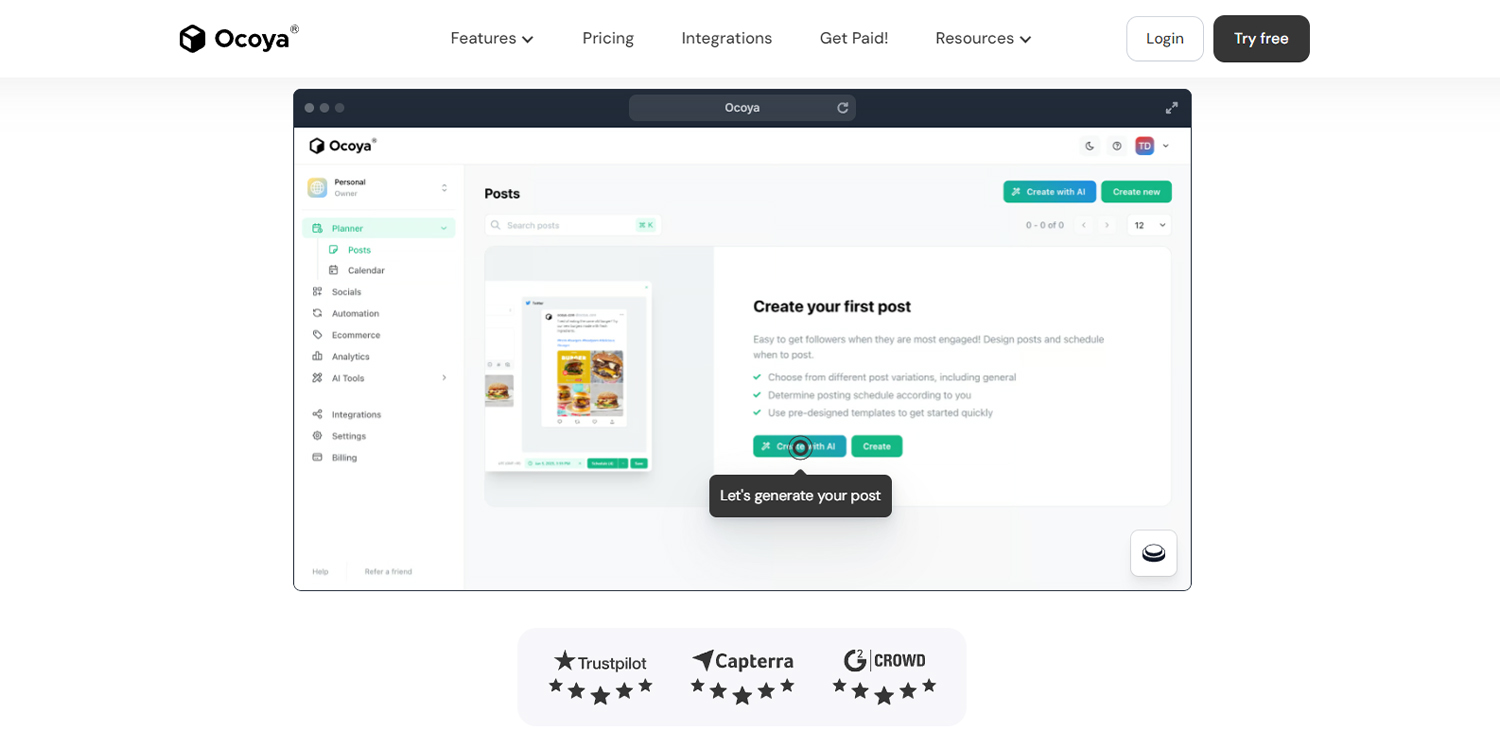
Ocoya
Ever heard of Generative Social Media? Ocoya can help you generate and post content quickly - both manually and automatically. It’s like having ChatGPT, Canva, and Hootsuite all at your fingertips. The AI assistant helps you generate marketing content for social media posts or blogs in 26 languages. It also provides thousands of image or video templates with relevant, trending, and freshly updated hashtags. Additionally, you get templates to announce new products, link shorteners to save space on long links in captions, and you can create workspaces for collaboration. The platform offers over 30+ integrations. With just a few clicks, post on all socials. You can also schedule automatically on all socials and view real-time metrics on performance.

GetResponse
GetResponse is an all-in-one marketing software that helps you send emails, automate marketing, and monetise content. You can create professional campaigns without design skills, automate your marketing without tech expertise, and grow your list with high-converting landing pages. Additionally, you can create online courses and premium newsletter subscriptions, and nurture a community with a comprehensive platform that gives you all the tools you need to create, market, and monetise content.
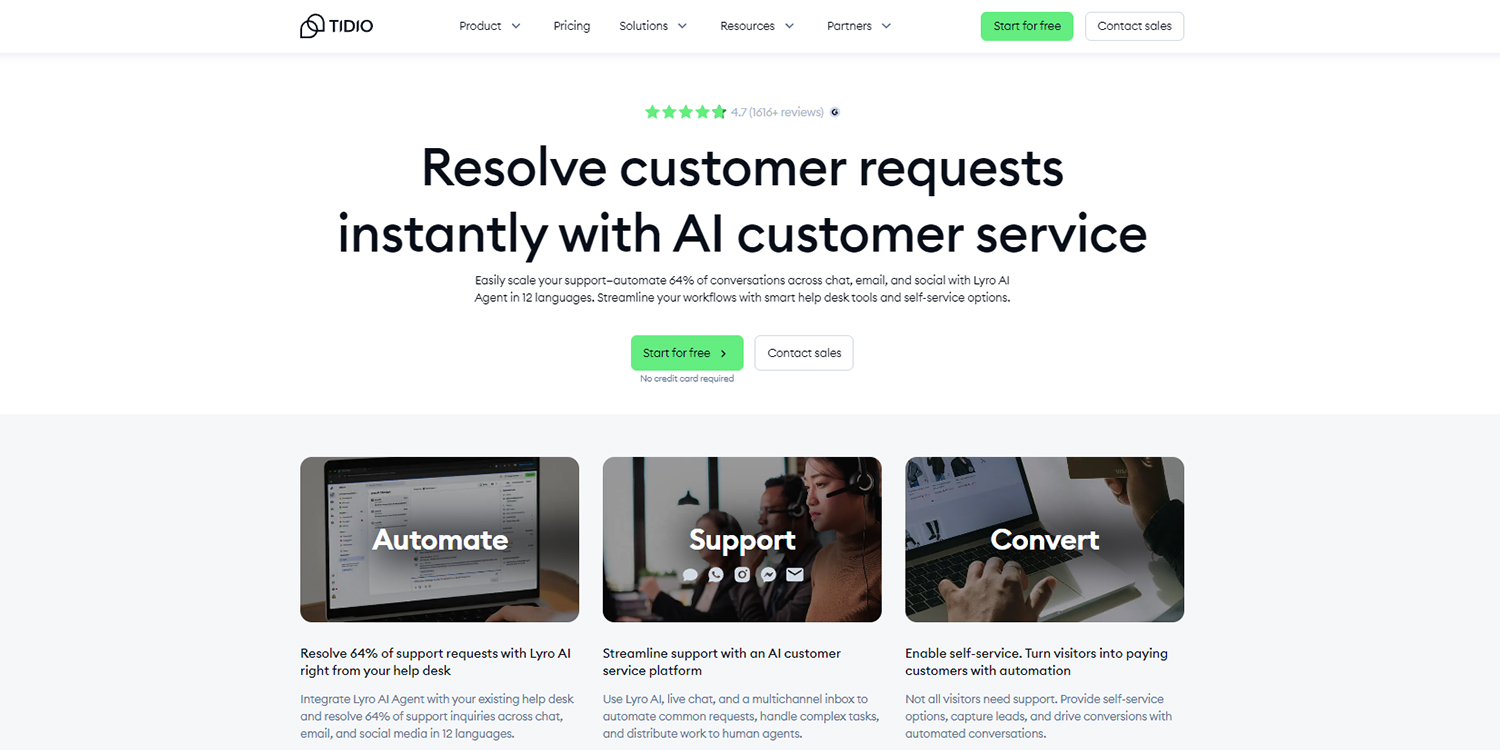
Tidio
Accelerate your growth with Tidio, a customer service AI tool. It can answer up to 70 per cent of customer enquiries, on any live channel and in dozens of languages, without human intervention. It answers customers in just 6 seconds using only your data and human-like language. Additionally, it can help answer common customer questions, freeing your support agents to focus on high-value requests. Convert more leads, provide stellar support, and supercharge your revenue using this game-changing AI-driven customer service solution.
How AI can help in managing inventory
AI tools make inventory management easier by predicting demand, automating restocking, and keeping stock levels in check. This helps businesses avoid stockouts, reduce waste, and run more efficiently.
Demand forecasting
AI predicts what will sell and when by analysing past sales, market trends, and customer behaviour. This helps businesses stock the right products at the right time, reducing overstock and preventing stockouts. With AI-driven demand forecasting, businesses can make smarter purchasing decisions, ensuring they always have what customers want without wasting money on excess inventory.
Keep stock levels in sync
AI automatically updates inventory across all sales channels, preventing overselling and stock discrepancies. Instead of manually tracking stock, businesses can rely on AI to sync inventory in real time, ensuring customers only see available products. This reduces the risk of cancelled orders due to stock errors and keeps operations running smoothly. With accurate stock updates, businesses can improve customer satisfaction and streamline order fulfilment.
Identify reliable suppliers
AI tracks supplier performance by analysing order fulfilment speed, product quality, and stock availability. It helps businesses identify reliable suppliers and detect potential issues early, such as delayed shipments or inconsistent stock levels. This allows businesses to switch to better suppliers before problems escalate. By ensuring a steady supply of products, AI reduces fulfilment delays, improves the customer experience, and strengthens supplier relationships.
Never run out of stock
AI tools set smart reorder points based on real-time sales data, seasonal trends, and supplier lead times. They alert businesses when stock levels are low and can even automate reordering to prevent stockouts. This ensures that popular products remain available without overloading storage with excess stock. By optimising restocking, AI helps businesses maintain a steady supply of in-demand items while avoiding unnecessary holding costs.
Minimise dead stock
AI identifies slow-moving products by tracking sales velocity and customer interest. It suggests strategies like discounts, bundles, or targeted promotions to clear out unsold inventory. This prevents dead stock from taking up valuable storage space and helps businesses recover costs. By continuously analysing product performance, AI ensures inventory stays fresh and aligned with current market demand, allowing businesses to focus on selling what customers actually want.
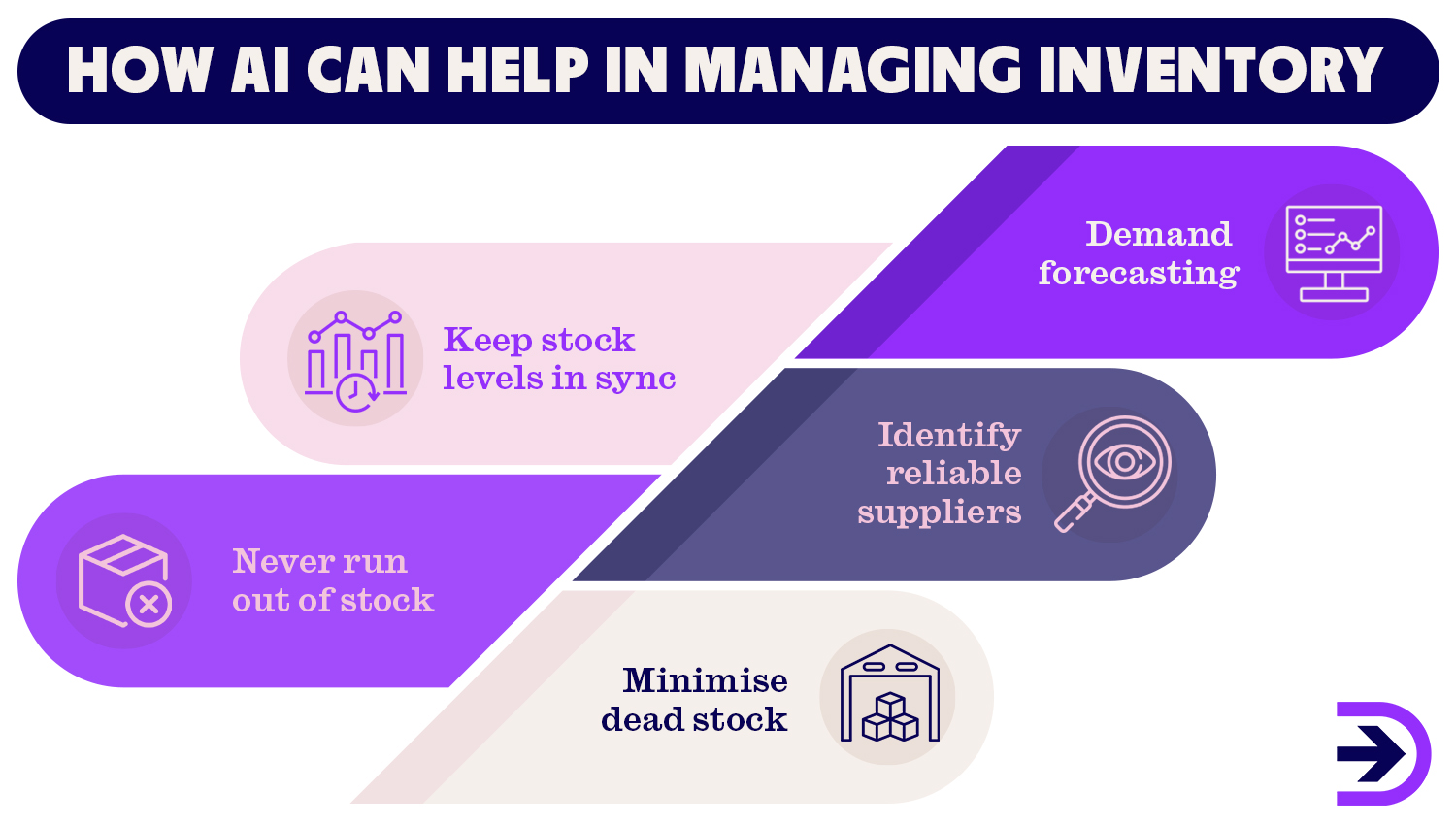
Role of AI in marketing for dropshipping in 2025
AI is revolutionising how dropshipping businesses approach marketing. It offers innovative tools and strategies to enhance efficiency, personalisation, and customer engagement.
AI-powered personalisation
AI helps dropshipping retailers deliver highly personalised shopping experiences by analysing customer behaviour, preferences, and purchase history. AI-driven recommendations, dynamic pricing, and automated email campaigns ensure shoppers see relevant products, boosting conversion rates. AI-powered chatbots and virtual assistants also enhance customer engagement by offering tailored support, mimicking human-like interactions, and improving customer retention.
Predictive analytics for demand forecasting
AI-driven predictive analytics allow retailers to anticipate demand trends, reducing stockouts and overstock issues. By analysing past sales data, search trends, and market conditions, AI can help retailers adjust their product offerings and marketing strategies in real time. This improves operational efficiency and ensures that marketing budgets are spent on high-performing products, maximising profitability.
AI-optimised ad campaigns
AI tools optimise paid advertising campaigns by analysing performance data and automatically adjusting targeting, bidding, and creatives. It also helps refine Facebook, Google, and TikTok ads, ensuring higher ROI by identifying the best-performing audience segments. AI can also generate compelling ad copy and visuals, reducing the need for manual testing and accelerating campaign success.
AI-powered content generation
AI tools assist in generating product descriptions, blog posts, social media content, and ad copy tailored to specific audiences. AI-driven writing assistants enhance SEO content strategies, ensuring product pages rank higher on search engines. These tools can analyse competitor content, suggest high-ranking keywords, and create human-like, engaging content that converts browsers into buyers.
Automated customer support with AI chatbots
AI chatbots provide 24/7 customer support, handling enquiries, order tracking, and basic troubleshooting. Advanced AI chatbots offer more natural conversations, resolving issues faster, and enhancing customer satisfaction. By automating support, retailers can reduce response times, minimise human intervention, and improve overall shopping experiences.
AI-driven social media insights
AI analyses social media trends and audience sentiment, helping dropshipping businesses create data-driven social media strategies. AI tools also track engagement patterns, suggest optimal posting times, and recommend trending topics, ensuring brands stay relevant. AI-generated insights will enable businesses to craft viral campaigns, improve influencer collaborations, and enhance brand loyalty.
AI for dynamic pricing strategies
AI-driven pricing tools analyse competitor pricing, customer behaviour, and demand fluctuations to adjust product prices in real time. Retailers can leverage AI to implement competitive pricing strategies that maximise sales while maintaining profitability. By offering personalised discounts and time-sensitive deals, AI ensures businesses stay ahead in an increasingly competitive market.
AI-powered email marketing automation
AI enhances email marketing by segmenting audiences, predicting the best send times, and personalising email content. AI tools also analyse past interactions to send hyper-relevant product recommendations, abandoned cart reminders, and exclusive deals. With AI-driven automation, dropshipping retailers can nurture leads more effectively, increasing open rates, click-throughs, and sales.
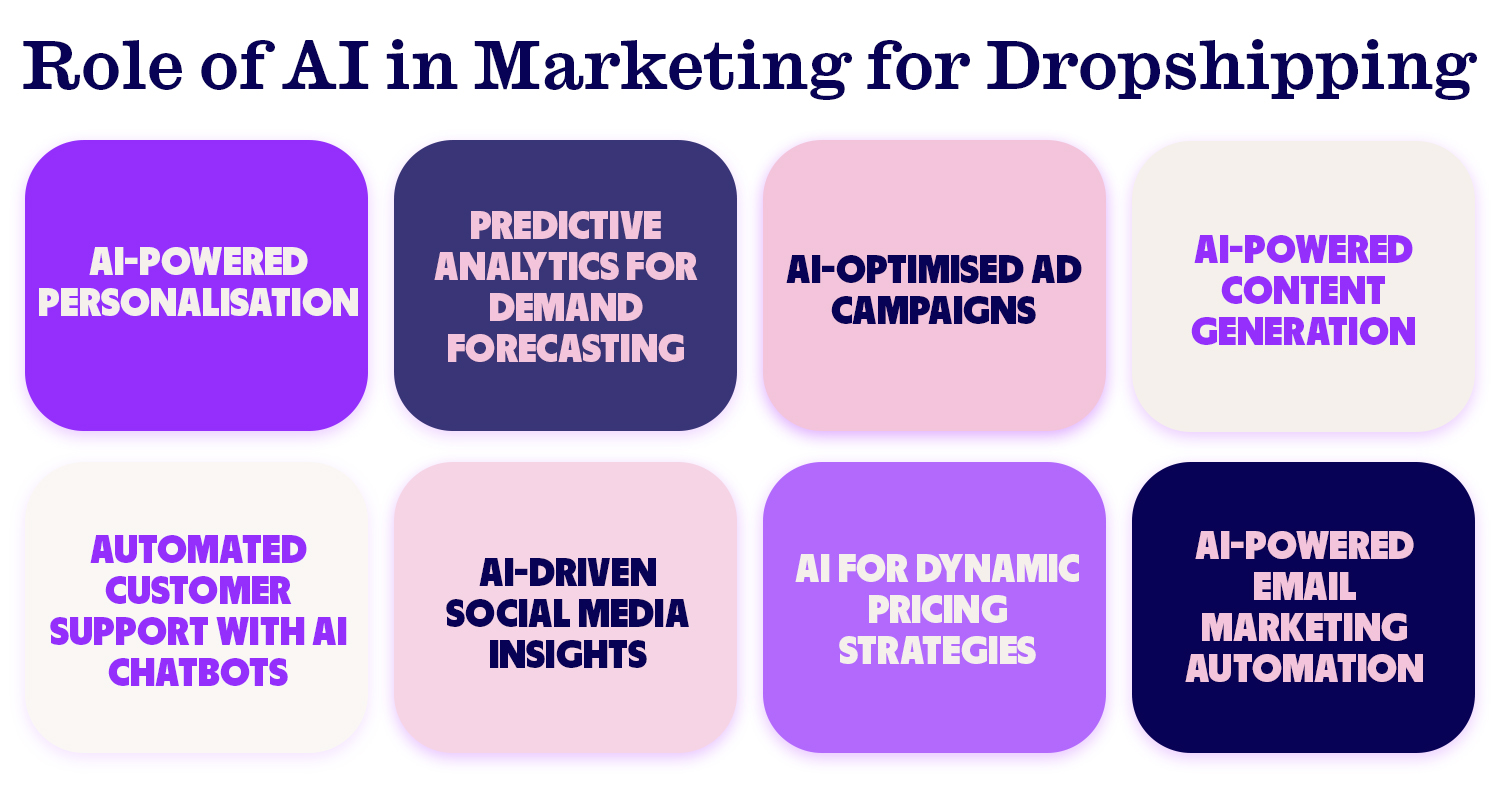
Drawbacks of AI
As with any emerging technology, there can be challenges when it comes to implementation. Let’s look at some of the drawbacks of using AI.
Bias and discrimination
AI systems can inherit biases from the data they are trained on. For example, a 2018 study revealed that an AI tool used by Amazon for recruiting was biased against women, as it was trained on resumes predominantly submitted by men. This led to the AI favouring male candidates, negatively impacting female applicants. Such biases can create inequalities in the workplace and create barriers to fair hiring practices. When it comes to ecommerce, this bias can lead to unreliable data collection, unequal customer service, and incorrect product suggestions. This highlights the importance of bias-free data and transparency in AI systems.
Lack of human judgement
AI lacks the understanding and empathy that humans bring to decision-making. For example, AI misdiagnosing conditions occurred with IBM’s Watson for Oncology. The AI system was designed to assist doctors in diagnosing and recommending cancer treatments. However, reports from 2018 revealed that Watson sometimes suggested incorrect or unsafe treatment options. For instance, in one case, it recommended a drug that could worsen a patient’s condition rather than improve it. The issue arose because Watson was trained on hypothetical patient data rather than real-world clinical cases, leading to flawed recommendations.
Job displacement
AI and automation are expected to displace jobs in various industries. For instance, in the manufacturing sector, robots have replaced assembly line workers, and AI-powered chatbots are taking over customer service roles. While AI creates new opportunities, it also raises concerns about the future of work, as many individuals may not have the skills to transition into new roles that AI cannot fill.
Security and privacy risks
AI-driven systems can be vulnerable to hacking and misuse. In 2021, hackers gained access to Verkada’s security cameras, exposing live feeds from Tesla, hospitals, jails, and schools. The hacking group breached 150,000 cameras by exploiting an admin account. This incident raised serious concerns about data privacy and the potential misuse of AI-powered security technology and highlighted the need for stronger cybersecurity measures to prevent unauthorised access to sensitive footage.
Future of AI in dropshipping and ecommerce
AI will continue to shape the future of ecommerce and dropshipping, making businesses more efficient, profitable, and customer-focused.
Smart product recommendations
AI-powered recommendation engines will refine product suggestions based on browsing history, past purchases, and customer behaviour. This will help retailers increase sales by offering highly relevant products, improving conversions, and enhancing the shopping experience.
AI-driven chatbots
AI chatbots will handle a larger share of customer enquiries, providing instant responses, order tracking updates, and even resolving common issues. This reduces the need for a support team while improving efficiency and customer satisfaction.
Automated pricing strategies
AI will optimise pricing in real time by analysing demand, competitor prices, and market trends. This means retailers can adjust prices dynamically, maximising profits without constant manual monitoring.
Enhanced fraud detection
AI will play a crucial role in detecting fraudulent transactions by analysing purchase patterns, identifying anomalies, and blocking suspicious activities. This can significantly help ecommerce businesses reduce chargebacks and improve security.
AI-powered personalisation
From personalised emails to dynamic website content, AI will create highly tailored experiences for shoppers. This will help improve engagement and increase conversion rates and customer retention.
Automated marketing campaigns
AI will streamline ad creation, ad targeting, and campaign management and create relevant product descriptions. Businesses will be able to run highly optimised Facebook, Google, and TikTok ads with AI-driven insights, which can help improve ad performance while reducing costs.
AI-optimised landing pages
AI will help create and test landing pages that adapt based on user behaviour, ensuring that every visitor sees the most effective content. This will, in turn, lead to higher conversions with minimal manual effort.
Recommended suggestions for using AI in dropshipping and ecommerce
Embracing AI enables dropshipping businesses to take a data-driven approach. Here are some key strategies to keep your dropshipping store ahead of the competition.
-
Leverage AI to analyse customer data for suggesting relevant products and boosting conversions.
-
Use AI chatbots for customer support to ensure quick and efficient responses.
-
With AI tools, adjust pricing in real time based on demand and competition.
-
Identify and prevent suspicious transactions with advanced AI technologies.
-
Use AI analytics tools to predict demand to maintain optimal stock levels.
-
Optimise ads, emails, and campaigns with AI insights.
-
With AI-powered voice and visual search technology, improve product discoverability.
FAQs
Is AI expensive to implement in ecommerce?
Many AI tools are affordable and scalable, with options ranging from free chatbots to advanced analytics and automation platforms.
Will AI replace human involvement in dropshipping?
AI automates repetitive tasks, but human oversight is still essential for strategy, branding, and customer relationships.
How can AI help improve my dropshipping business?
AI enhances product recommendations, automates customer support, optimises pricing, and improves marketing, making your business more efficient and profitable.
Summary
AI is transforming dropshipping and ecommerce by automating key processes, enhancing customer experiences, and optimising business operations. From offering personalised recommendations and AI-driven chatbots to smart inventory forecasting and automated marketing, AI helps businesses make data-driven decisions and scale efficiently while staying competitive. By leveraging AI-powered advanced data analysis tools, retailers can improve sales, reduce tedious research and manual effort, and provide a seamless shopping experience. As AI technology continues to evolve, embracing it will be essential for long-term success in the ever-changing ecommerce landscape.
